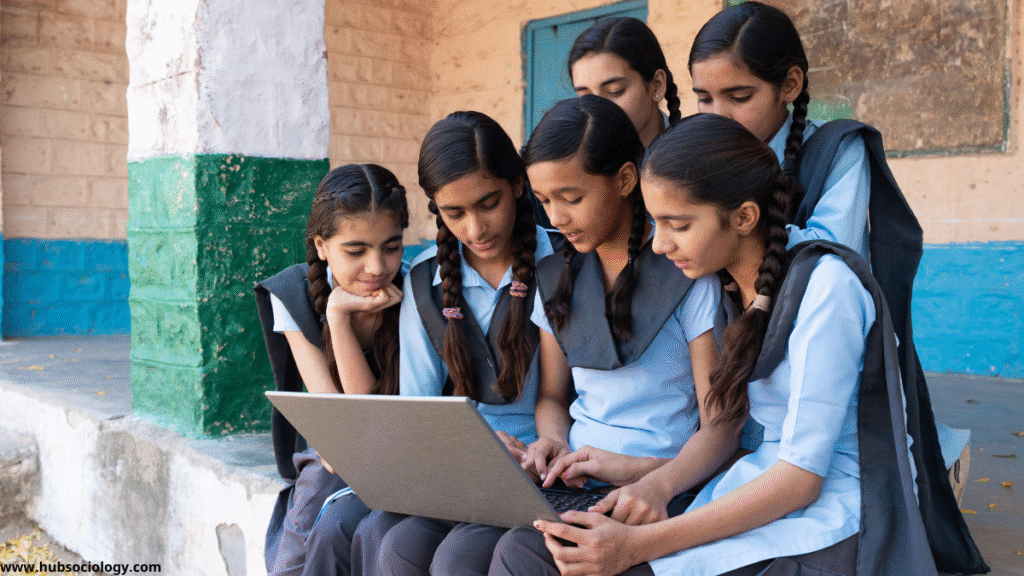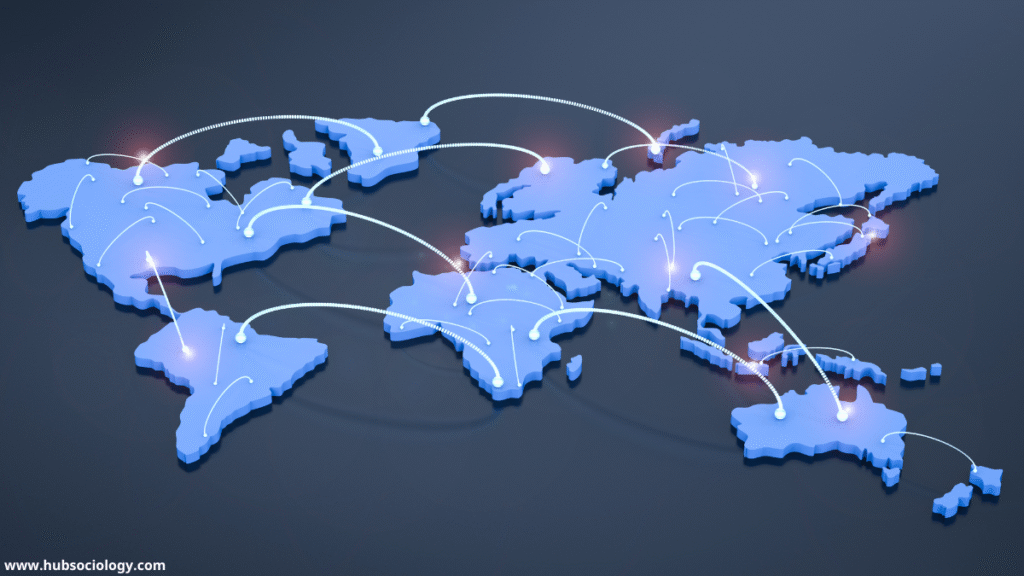Introduction on Information and Communication Technology
The rise of Information and Communication Technology (ICT) has transformed human societies in unprecedented ways. From the printing press to the internet and artificial intelligence, Information and Communication Technology has shaped how people communicate, access knowledge, build relationships, and organize their social, economic, and political lives. In sociology, Information and Communication Technology is not merely seen as a technological advancement but as a driver of structural and cultural change that influences power relations, social identities, and community formations. The sociological aspect of Information and Communication Technology explores how it redefines social interactions, creates new inequalities, and shapes modern culture in the global age.

Information and Communication Technology as an Agent of Social Change
Sociologists often study Information and Communication Technology as a catalyst of social change. Like the Industrial Revolution transformed production and labor, the Information and Communication Technology revolution has reshaped communication, information sharing, and knowledge systems. Manuel Castells, in his theory of the “Network Society,” argues that Information and Communication Technology has created a new social structure where networks, rather than hierarchies, dominate. These networks transcend geographical boundaries, making global communication instantaneous and interactive.
Information and Communication Technology accelerates processes of globalization by connecting distant communities. For example, social media platforms allow people from different cultural backgrounds to interact in real time, influencing cultural exchange, hybridization, and sometimes homogenization. Information and Communication Technology has also altered institutions like education, healthcare, governance, and family life, leading to new patterns of socialization and behavior.
Impact on Communication and Social Interaction
One of the most profound sociological impacts of Information and Communication Technology is its transformation of communication. Traditional face-to-face interaction has been supplemented—and sometimes replaced—by mediated communication through smartphones, social media, and instant messaging. Erving Goffman’s concept of “presentation of self” finds new meaning in digital spaces, where individuals carefully curate their online identities.
On one hand, Information and Communication Technology promotes connectivity, enabling people to maintain relationships despite geographical distances. On the other hand, it creates new social issues such as online alienation, cyberbullying, and the weakening of community bonds. Sociologists describe this as the paradox of Information and Communication Technology: while it fosters global connections, it may also erode local, face-to-face community life.
ICT and Social Inequality
The rise of Information and Communication Technology has created a new dimension of inequality often referred to as the digital divide. This divide exists between those who have access to Information and Communication Technology and those who do not, as well as between those who possess digital literacy and those who lack it. In many developing countries, Information and Communication Technology remains concentrated among urban elites, leaving rural populations at a disadvantage in terms of education, employment opportunities, and political participation.

Pierre Bourdieu’s concepts of “cultural capital” and “social capital” help explain how ICT reproduces inequality. Digital literacy becomes a form of cultural capital, giving individuals access to better jobs and networks. Similarly, social media presence can enhance social capital by providing visibility, influence, and connectivity. Those excluded from ICT access face marginalization, deepening social stratification.
ICT and Education
Education has been profoundly shaped by ICT. Online learning platforms, digital libraries, and interactive technologies have democratized knowledge, making it accessible beyond physical classrooms. From a sociological perspective, ICT challenges traditional teacher-student hierarchies and promotes self-directed learning.
However, sociologists also warn of the risks of unequal access. Students from disadvantaged backgrounds may lack internet facilities or digital devices, leading to unequal learning outcomes. During the COVID-19 pandemic, this became especially evident when online education widened class divides. Thus, ICT both empowers and excludes, depending on access and resources.
ICT, Economy and Labor
ICT has also transformed the economic sphere, giving rise to what is often called the “information economy.” Workplaces have adopted digital systems, online transactions, and telecommuting. The gig economy, powered by platforms such as Uber, Swiggy, and Fiverr, has redefined traditional employment patterns.
From a sociological lens, ICT introduces flexibility but also precarity. Workers may enjoy independence and global opportunities, yet they face instability, lack of labor rights, and algorithmic surveillance. Marxist sociologists highlight that ICT-driven capitalism intensifies exploitation, as workers are increasingly monitored and controlled by digital platforms. Conversely, functionalist perspectives emphasize the efficiency and innovation ICT brings to production and service delivery.
ICT and Politics
ICT has significantly shaped political participation and mobilization. Social media platforms have become powerful tools for political communication, activism, and resistance. Movements such as the Arab Spring, #MeToo, and climate activism demonstrate how ICT can amplify marginalized voices and challenge authoritarian regimes.
At the same time, ICT has created new problems of misinformation, propaganda, and digital surveillance. Governments and corporations use ICT for mass surveillance, raising concerns about privacy and civil liberties. From a Foucauldian perspective, ICT represents a new form of “panopticon,” where citizens are constantly monitored through data collection and surveillance technologies.
ICT and Culture
ICT has created what Marshall McLuhan famously described as the “global village.” Through media, music, films, and digital platforms, cultural products circulate globally, breaking down barriers between societies. This has resulted in cultural hybridization—where global and local cultures blend—and the rise of transnational identities.
Yet, sociologists also highlight cultural imperialism, where dominant cultures overshadow indigenous traditions through ICT-driven globalization. For instance, Western media giants dominate the global entertainment industry, influencing values, lifestyles, and consumption patterns worldwide.
ICT, Family and Personal Life
ICT reshapes the family and personal life as well. Communication technologies help families maintain connections across borders, particularly in migrant households. Video calls and instant messaging create virtual intimacy. However, ICT also intrudes into family life, as constant connectivity can blur boundaries between work and home.
From a symbolic interactionist perspective, ICT redefines roles within the family. Children often act as “digital natives,” teaching parents about technology, reversing traditional generational authority. Additionally, dating apps and online relationships reshape intimacy, marriage patterns, and kinship structures.
ICT and Globalization
ICT is the backbone of globalization, enabling instantaneous flows of information, capital, and ideas. Ronald Robertson’s idea of “glocalization” is relevant here: ICT facilitates global interconnection while allowing local adaptation. For example, global platforms like YouTube or Netflix host local content, blending global reach with cultural specificity.

However, globalization through ICT also generates tensions—such as job outsourcing, cultural homogenization, and the erosion of local economies. Sociologically, ICT must be seen as both integrative and disruptive, expanding opportunities while generating conflicts.
Challenges and Critiques
While ICT has immense potential, sociologists raise several critiques:
- Surveillance Capitalism: Corporations exploit user data for profit, raising ethical concerns.
- Digital Addiction: Overuse of ICT leads to psychological issues like anxiety, isolation, and reduced attention spans.
- Fake News and Polarization: ICT platforms often amplify misinformation, fueling political and social polarization.
- Job Displacement: Automation and AI threaten traditional forms of employment, leading to structural unemployment.
- Cultural Erosion: ICT-driven globalization risks diminishing indigenous cultures and traditions.
Conclusion
The rise of Information and Communication Technology is not merely a technological phenomenon but a sociological revolution. It reshapes communication, education, economy, politics, and culture, redefining human interaction and social organization. From the optimism of increased connectivity to the anxieties of inequality and surveillance, ICT reflects both the promises and contradictions of modern society.
For sociologists, the challenge is to critically analyze ICT’s role in shaping power relations, identities, and inequalities while exploring ways to harness it for social good. As ICT continues to evolve—with artificial intelligence, virtual reality, and quantum computing—the sociological perspective remains crucial in understanding its complex impacts on society.
Do you like this this Article ? You Can follow as on :-
Facebook – https://www.facebook.com/hubsociology
Whatsapp Channel – https://whatsapp.com/channel/0029Vb6D8vGKWEKpJpu5QP0O
Gmail – hubsociology@gmail.com
Exam-style questions
5 Marks Questions
(Short Answer – Test basic understanding)
- Define Information and Communication Technology (ICT) in sociology.
- What is meant by the term digital divide?
- Mention two ways ICT has influenced education.
- How does ICT contribute to globalization?
- Explain the concept of “global village” by Marshall McLuhan in the context of ICT.
- What role does ICT play in political mobilization?
- Give two examples of negative impacts of ICT on personal life.
- State one sociological perspective on ICT and inequality.
- What is meant by surveillance in the age of ICT?
- How has ICT affected family communication?
10 Marks Questions
(Medium-length answers – Analytical and explanatory)
- Discuss the role of ICT as an agent of social change with suitable examples.
- Explain how ICT has reshaped communication and social interaction in contemporary society.
- What is the significance of Manuel Castells’ concept of the Network Society in understanding ICT?
- Examine the impact of ICT on the economy and labor with reference to the gig economy.
- How does ICT contribute to both equality and inequality in education?
- Evaluate the role of ICT in shaping political movements and resistance.
- Discuss the cultural impact of ICT with reference to cultural hybridization and imperialism.
- How has ICT transformed the nature of work and employment patterns?
- Analyze the relationship between ICT and globalization using Ronald Robertson’s concept of glocalization.
- Briefly explain three major challenges created by the rise of ICT in society.
15 Marks Questions
(Long Answer – Critical, interpretative, and comprehensive)
- Critically analyze the role of ICT in creating social inequalities through the concept of the digital divide.
- Examine the sociological implications of ICT on family, education, and personal relationships.
- “ICT is both a tool of empowerment and a mechanism of control.” Discuss with sociological examples.
- Explain the relationship between ICT and politics, focusing on activism, surveillance, and misinformation.
- Discuss how ICT has shaped modern culture in terms of globalization, cultural imperialism, and identity formation.
- Analyze the economic transformations brought about by ICT with reference to labor, capitalism, and precarity.
- Evaluate the sociological perspectives (Functionalist, Marxist, and Interactionist) on the rise of ICT.
- Discuss the concept of surveillance capitalism and its impact on social behavior and privacy.
- “ICT creates a paradox: it connects people globally but isolates them locally.” Critically examine this statement.
- In what ways does ICT represent both continuity and change in human society? Support your answer with sociological arguments.

6 thoughts on “The Rise of Information and Communication Technology: A Sociological Perspective”